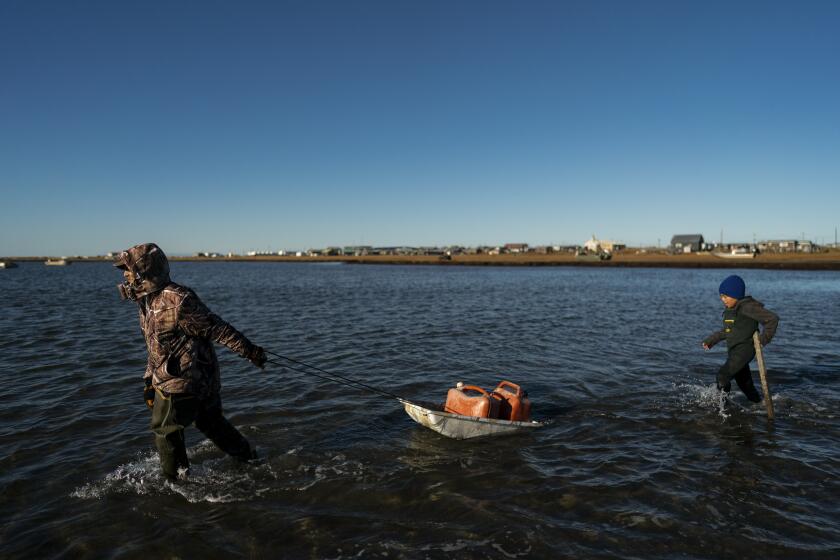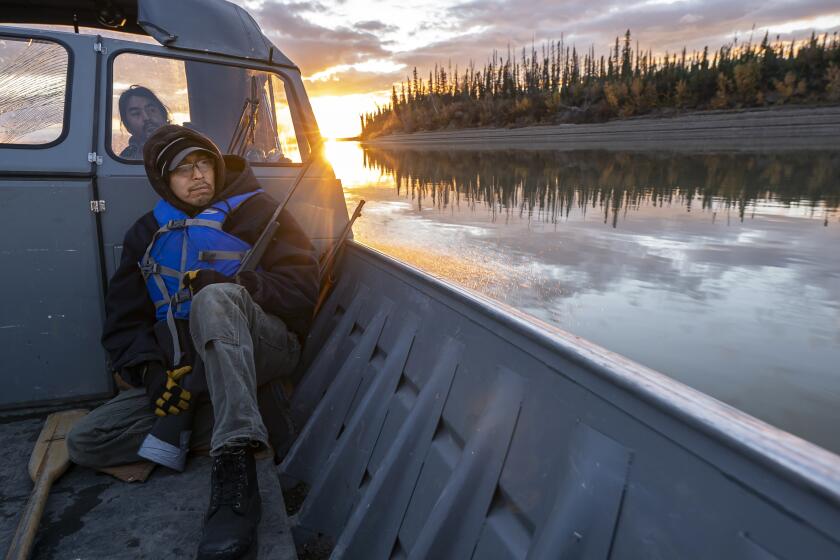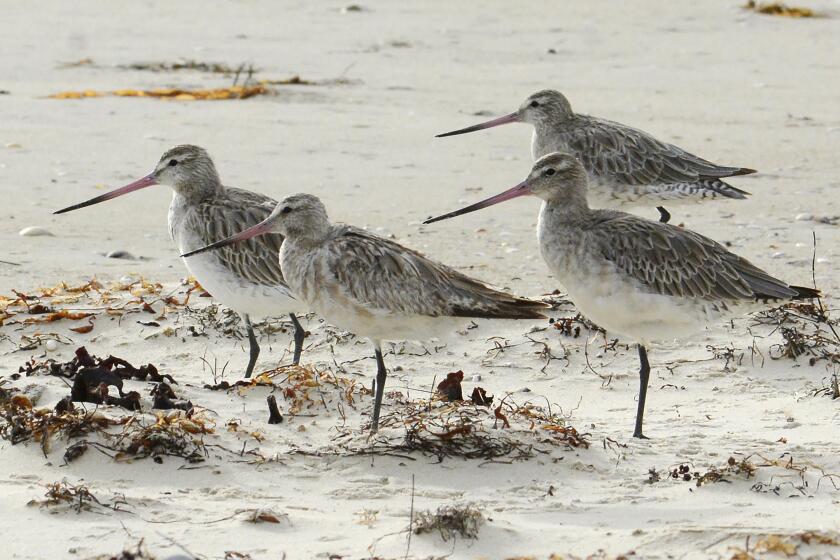FEMA fires California company for nonsensical Alaska Native translations on aid applications

- Share via
ANCHORAGE — After tidal surges and high winds from the remnants of a rare typhoon caused extensive damage to homes along Alaska’s western coast in September, the U.S. government stepped in to help residents — largely Alaska Natives — repair property damage.
Residents who opened Federal Emergency Management Agency paperwork expected to find instructions in Alaska Native languages such as Yup’ik or Inupiaq on how to file for aid. Instead, they were confronted with a number of bizarre phrases.
“Tomorrow he will go hunting very early, and will [bring] nothing,” read one passage. The translator randomly added the word “Alaska” in the middle of the sentence.
“Your husband is a polar bear, skinny,” another said.
Yet another was written entirely in Inuktitut, an Indigenous language spoken in northern Canada, far from Alaska.
FEMA fired the California company hired to translate the documents once the errors became known, but the incident was an ugly reminder for Alaska Natives of the suppression of their culture and languages from decades past.
The Alaska Native village of Shishmaref is on a sinking barrier island in the Chukchi Sea, where it is constantly threatened by the effects of climate change.
FEMA immediately took responsibility for the translation errors and corrected them, and the agency is working to make sure it doesn’t happen again, spokesperson Jaclyn Rothenberg said. No one was denied aid because of the errors, which were first reported by KYUK Public Media in Bethel, Alaska.
Caroline Lee, the CEO of Accent on Languages, the Berkeley-based company that produced the mistranslated documents, said in a statement: “We make no excuses for erroneous translations, and we deeply regret any inconvenience this has caused to the local community,”
She said the company would refund FEMA the $5,116 it received for the work and conduct an internal review to ensure it didn’t happen again.
Lee did not respond to follow-up questions, including how the mistaken translations occurred.
Two salmon species have all but disappeared from Alaska’s Yukon River this year, prompting the state to shut down fishing in an effort to save them.
For Tara Sweeney, an Inupiaq who served as an assistant secretary of Indian Affairs in the U.S. Interior Department during the Trump administration, the incident was another painful reminder of steps taken to prevent Alaska Native children from speaking Indigenous languages.
“When my mother was beaten for speaking her language in school, like so many hundreds, thousands of Alaska Natives, to then have the federal government distributing literature representing that it is an Alaska Native language, I can’t even describe the emotion behind that sort of symbolism,” Sweeney said.
She called for a congressional oversight hearing to uncover how long and widespread the practice of outsourcing translations has been used throughout government.
“These government contracting translators have certainly taken advantage of the system, and they have had a profound impact, in my opinion, on vulnerable communities,” said Sweeney, whose great-grandfather, Roy Ahmaogak, invented the Inupiaq alphabet more than a half-century ago.
News Alerts
Get breaking news, investigations, analysis and more signature journalism from the Los Angeles Times in your inbox.
You may occasionally receive promotional content from the Los Angeles Times.
She said his intention was to create the characters so “our people would learn to read and write to transition from an oral history to a more tangible written history.”
U.S. Rep. Mary Peltola (D-Alaska), who is Yup’ik and last year became the first Alaska Native elected to Congress, said it was disappointing that FEMA missed the mark with these translations but didn’t call for hearings.
“I am confident FEMA will continue to make the necessary changes to be ready the next time they are called to serve our citizens,” she said.
About 1,300 people have been approved for FEMA assistance after the remnants of Typhoon Merbok created havoc as it traveled about 1,000 miles north through the Bering Strait, potentially affecting 21,000 residents. FEMA has paid out about $6.5 million, Rothenberg said.
A young bar-tailed godwit appears to have set a nonstop distance record for migratory birds by flying at least 8,435 miles from Alaska to the Australian state of Tasmania.
Preliminary estimates put overall damage at slightly more than $28 million, but the total is likely to rise after more assessment work is done after the spring thaw, said Jeremy Zidek, a spokesperson for the Alaska Department of Homeland Security and Emergency Management.
The poorly translated documents, which did not create delays or problems, were a small part of efforts to help people register for FEMA assistance in person, online and by phone, Zidek said.
Central Alaskan Yup’ik is the largest of the Alaska Native languages, with about 10,000 speakers in 68 villages across southwest Alaska. Children learn Yup’ik as their first language in 17 of those villages. There are about 3,000 Inupiaq speakers across northern Alaska, according to the language center.
More to Read
Sign up for Essential California
The most important California stories and recommendations in your inbox every morning.
You may occasionally receive promotional content from the Los Angeles Times.
















